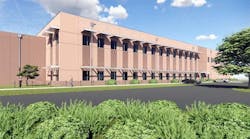Rezoning for PW Digital Gateway Data Centers Approved By Virginia's Prince William County Supervisors
As reported by Inside Nova, Virginia's Prince William Board of County Supervisors today approved rezoning for the PW Digital Gateway, after a more than 27-hour meeting including a public hearing and presentations from developers QTS and Compass Datacenters. The approval vote should enable construction of what’s expected to become the largest data center corridor in the world.
As previously examined by DCF, after nearly two years of intense controversy, for the PW Digital Gateway project, Compass Datacenters and QTS have plans to build 23 million SF of data center space over the next 10 years in Northern Virginia.
The data center developers leveraged rezoning submissions as an opportunity to address community concerns about the project's impact on local water, noise. traffic and historic sites that include African-American cemeteries and the nearby Manassas Battlefield National Park.
PW Digital Gateway Background
The Prince William Digital Gateway is a 2,100-acre technology corridor proposed by homeowners along Pageland Lane in western Prince William County near the town of Gainesville, who organized an initiative to bundle more than 200 properties into a massive business park.
As previously noted by DCF, over the last seven years, Prince William County has sought data centers as a targeted industry, and in 2016 created a Data Center Opportunity Zone Overlay District, aligning development with planning priorities and properties with supporting infrastructure.
County finance officials estimate that, as now approved, the Prince William Digital Gateway represents a potential investment of $24.7 billion, and annual tax revenue of $400.5 million. County revenue from data center taxes is expected to hit $100 million in 2023.
Compass Datacenters and QTS Data Centers leveraged rezoning submissions are an opportunity to address community concerns about the project's impact on local water, noise. traffic and historic sites that include African-American cemeteries and the nearby Manassas Battlefield National Park.
Compass has shared extensive details of its plans on a special section of its web site for Prince William residents in which it outlines the plans for its portion of its project, the Compass Datacenters Prince William County Campus I. Compass said it has conducted 18 months of "rigorous analysis," which is reflected in the details of its plans.
The scope of the project grew by 5 million square feet since the initial filings of interest from the developers, with both Compass and QTS expanding their planned square footage. The Digital Gateway was already the largest data center megacampus ever proposed.
Green Light Means Go
The project today was given a green light by the Prince William Board of County Supervisors' Democratic majority, with all Republicans dissenting. The final vote in favor was 4-3, with Democratic Supervisor Kenny Boddye of the Occoquan District abstaining, as reported by Inside Nova.
The project was approved despite widespread public opposition and recent, well publicized recommendations for denial from both the Prince William County Planning Commission and the county’s professional planning staff.
During the marathon hearing, representatives from QTS Realty Trust Inc. and Compass Datacenters made their cases to the supervisors as to why the rezoning applications should be approved, even in the face of stark rejection "from two authoritative government institutions," as stated by the report.
The decision to approved came after more than 27 hours of public comment and hearings with county staff and developers. "The board’s vote is all but certain to spawn legal challenges from opponents," noted Inside Nova's reporting, adding, "One advocacy group has already threatened litigation, a warning the board’s attorney deemed probable."
The board's Democratic majority supported the PW Digital Gateway from the outset, contending that the project, which is projected to generate up to $400 million each year once built out, will be a boon for commercial tax revenue, and could go toward schools and other services in the steadily growing county of 487,000 residents.
PW Digital Gateway Opposition and Concessions
This week's hearing drew hundreds of Prince William residents, who aired concerns during the public hearing. A major point of contention was avoiding any impact impact on the nearby Manassas Battlefield historic area and the preservation of sites of historic interest.
As noted in recent reporting this week from the Washington Post (WaPo) by Antonio Olivo, those against the plan say the data centers and the electric infrastructure needed to support them will ruin the view at Manassas National Battlefield Park and in some portions of the nearby Heritage Hunt retirement community.
Opponents also argued that the data centers damage the environment by causing noise problems and put extra strain on the regional power grid, which has already been struggling to keep up with the demand brought by new data center construction in Northern Virginia.
Olivo's report added:
"Compass said its portion of the project will require as much as 1.7 gigawatts of electric capacity when completed, enough to power nearly 1.3 million homes. QTS said it would have about 60 percent of that capacity. The three rezoning applications that make up the Digital Gateway project have experienced some setbacks, including the most recent staff report....Earlier this year, the county planning commission also recommended against approving an earlier iteration of the plan. Among other things, that version lacked details on where the buildings would go and where electric substations used to route power into the buildings would be installed, the county said."
Further, according to the Washington Post reporting, Compass and QTS said they could offer details on where buildings would go only for their first stages of development, with the first building expected to begin operating by about 2026 per approval of the application.
WaPo's Olivo also revealed:
"To deal with environmental concerns, Compass said it plans to install a system that will treat runoff from rain, then release it through a strawlike mechanism to reduce the flow into surrounding streams — with the goal of the discharge being as clean as discharge from undeveloped areas. QTS has offered to replace every tree affected by the development with another one elsewhere on the site....The two companies have also committed to developing a system of hiking trails, bike paths and other recreational park activities on about 270 acres of open space that will be publicly accessible, with portions of those trails winding past the data centers. QTS plans to purchase and set aside an additional 51 acres as parkland."
Finally, WaPo reported that the data center developers said they will conduct noise studies before and after each building begins operation to ensure that they abide by the county’s noise ordinance, which limits daytime noise to 60 decibels and 55 decibels at night. Meanwhile, as many as 60 backup generators per building will be included as a safeguard against power failures will be tested on a rolling basis once per month, the companies said.
In its report recommending denial of the project prior to yesterday's hearing, the county planning staff said the latest version of the project still did not conform with the comprehensive plan for the area and other policies that encourage the depiction of site layouts for rezoning and special use permit applications.
As noted by Datacenter Dynamics, "This week’s meeting came after Prince William County staff recommended the denial of the site's rezoning request twice in recent months. Last month the planning commission voted to recommend denial of the project ahead of the final vote by the County Board of Supervisors."
As also reported by DCist:
In comments before the vote, Board Chair Ann Wheeler criticized opponents of the Digital Gateway, accusing them of spreading misinformation, refusing to come to the table to consider the idea in good faith, and engaging in character assassination of members of the board. She said the economic benefits to the county in corporate investment, job creation and tax revenue were enormous.
“$40 billion in investment in this county … would be transformational,” she said. “Most places would kill for investment like that.”
The DCist report also pointed out that "the Digital Gateway, at more than 23 million square feet of data center space, will put Prince William County roughly even with Loudoun County — home to the largest data center cluster in the world — in terms of [facilities]."
“QTS is grateful to Prince William County and the Board of Supervisors for entrusting us with stewardship of the Prince William Digital Gateway, which is projected to bring an estimated $500 million in annual tax revenue to the County," said a QTS statement commenting on the PW Digital Gateway's approval. "QTS will continue to work diligently with County staff, elected officials, and residents as it carries out its environmental and responsible development commitments. We are excited for this partnership to strengthen the Prince William community and bring increased local tax revenue and new job opportunities.”

Matt Vincent
A B2B technology journalist and editor with more than two decades of experience, Matt Vincent is Editor in Chief of Data Center Frontier.





